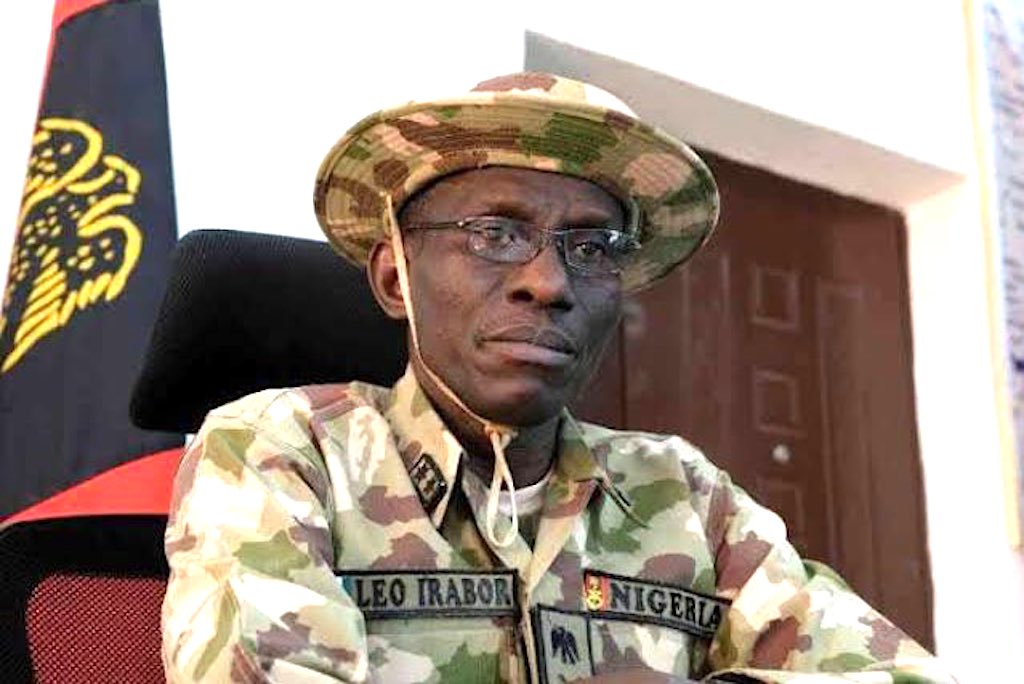
Major-General-Leo-Irabor-Chief-of-Army-Staff
By Mahmud Abdulsalam
There are various security and intelligence agencies in the country. And all of them have remained unwavering in tackling rising insecurity.
However, Boko Haram terrorists, armed bandits, kidnappers, armed robbers, pirates, and secessionist groups like the Indigenous People of Biafra, IPOB, still pose dangerous security threats to the nation and the Nigerian populace.
The southwest of Nigeria is plagued by a surge in cybercrime, armed robbery, kidnapping, domestic crime, extrajudicial killings, herder-farmer conflicts, ritual killings, and banditry.
The southeast is a haven for ritual killings, commercial crime, secessionist agitation, kidnapping, herder-farmer clashes, attacks by unknown gunmen, and banditry.
The south-south remains threatened by militancy, kidnapping, and environmental agitation. The northeast has been subject to a humanitarian crisis lasting over a decade and caused by the Boko Haram insurgency and the Islamic State in West Africa Province.
Meanwhile, the northwest is enmeshed in illegal mining, ethnoreligious killings, and banditry.
According to BusinessDay, rising violence in the country cost Nigeria 11% of its GDP with N119 billion. Similarly, projects worth N12 trillion were abandoned across Nigeria due to insecurity and other challenges according to data from TownTalk solutions.
In the same vein, the global peace index for 2021 compiled by the Institute for Economics and Peace ranked Nigeria 146th out of 163 countries with a score of 2.712, while among sub-Saharan African countries the country was ranked 39th out of 44 countries examined in the region.
According to experts, insecurity affects economic growth by drying out investments, increasing unemployment, and dwindling government revenue, among others.
The impact of insecurity is reflected in the performance of macroeconomic indicators, investment inflow as well as economic performance.
As of 2020, over $40.6 billion worth of foreign investments were diverted from the Nigerian economy as a result of insecurity according to the global terrorism index.
This had implications for job creation and economic prosperity as purchasing power declined. Nigeria is now regarded as the world’s poverty capital and has an estimated 91 million people living in extreme poverty which is projected to reach 106.6 million by 2030.
It is for these reasons and many others that the Chief Defence Staff (CDS), Gen. Leo Irabor, is advocating for a joint planning and execution of combat missions by all security services in the country.
Irabor made his advocacy at the closing of the week-long Joint Simulation Exercise (JSIMEX) for Operation Whirl Punch (OPWP) held at the Land Forces Simulation Centre Giri, Abuja.
The CDS was represented by the Director of Operations, Defence Headquarters, Rear Adm. Dahiru Amos. He said the conduct of the joint simulation exercise was the first step towards strengthening OPWP and other ongoing operations across the country.
He added that it was in line with his vision of fostering a professional Armed Forces capable of effectively meeting constitutional imperatives. According to him, the exercise has provided the needed opportunities for observations, critique and after-action review and wash up.
“This would further strengthen our efforts at identifying the gaps hindering the attainment of joint operational objectives. It is my believe that this exercise has enabled other opportunities for enhanced competencies at testing, conducting and evaluating, as well as analysing the effectiveness of our combat readiness and operations.
“Most importantly, the JSIMEX has shown the relevance of synergy in joint planning and execution of combat missions in the contemporary security environment,” he added.
Irabor promised to sustain and broaden the scope of the exercise to enable the three services to participate actively. He urged those who participated to bring to bear, all the lessons learnt from the exercise in the execution of ongoing operations across the country.
The CDS commended the Land Forces Simulation Centre for the successful conduct of the exercise in a conducive environment.
According to him, the exercise has outlined the need for joint and effective planning and coordination within the armed force towards bringing counter-terrorism, counter-insurgency and anti-banditry efforts to favourable conclusion.
“I urge the Director General, Land Forces Simulation Centre not to rest on his oars as he envisages application of knowledge and lessons learned in subsequent JSIMEX,” he added.
BEWARE All Rights Reserved. This material, and other digital content on this website, may not be reproduced, published, broadcast, rewritten or redistributed in whole or part without prior express written permission from Juliana Francis








